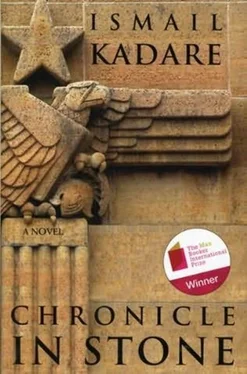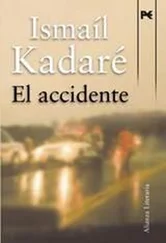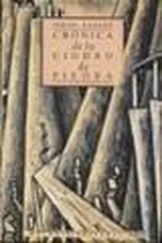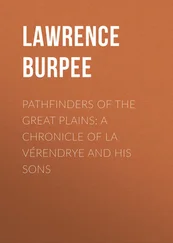Ismaíl Kadaré - Chronicle in Stone
Здесь есть возможность читать онлайн «Ismaíl Kadaré - Chronicle in Stone» весь текст электронной книги совершенно бесплатно (целиком полную версию без сокращений). В некоторых случаях можно слушать аудио, скачать через торрент в формате fb2 и присутствует краткое содержание. Жанр: Современная проза, на английском языке. Описание произведения, (предисловие) а так же отзывы посетителей доступны на портале библиотеки ЛибКат.
- Название:Chronicle in Stone
- Автор:
- Жанр:
- Год:неизвестен
- ISBN:нет данных
- Рейтинг книги:4 / 5. Голосов: 1
-
Избранное:Добавить в избранное
- Отзывы:
-
Ваша оценка:
- 80
- 1
- 2
- 3
- 4
- 5
Chronicle in Stone: краткое содержание, описание и аннотация
Предлагаем к чтению аннотацию, описание, краткое содержание или предисловие (зависит от того, что написал сам автор книги «Chronicle in Stone»). Если вы не нашли необходимую информацию о книге — напишите в комментариях, мы постараемся отыскать её.
Chronicle in Stone — читать онлайн бесплатно полную книгу (весь текст) целиком
Ниже представлен текст книги, разбитый по страницам. Система сохранения места последней прочитанной страницы, позволяет с удобством читать онлайн бесплатно книгу «Chronicle in Stone», без необходимости каждый раз заново искать на чём Вы остановились. Поставьте закладку, и сможете в любой момент перейти на страницу, на которой закончили чтение.
Интервал:
Закладка:
EIGHT
The siren didn’t go off. The guns of the battery didn’t fire as usual, nor did the old anti-aircraft unit. But the rumbling of engines thundered so loud that it seemed the sky would collapse. People ran for the shelters and waited to find out what was happening. The noise of the planes got louder and louder.
“What’s going on?”
“Why aren’t they dropping their bombs?”
It went on for some time. Who knows how long we would have stayed down there if we hadn’t heard that almost joyful voice at the top of the stairs.
“Come out, come out and look.”
We went out. We could hardly believe our eyes. The sky teemed with planes. They looped over the city like storks, then, one after another, peeled away and came in to land at the airfield.
Taking the stairs four at a time, I ran up the two flights to get a better look. I put the lens over one eye and sat by the window. The view was magnificent. The field below was filling with planes. Their gleaming white wings flashed as they slowly lined up in rows. I had never seen anything so captivating in my whole life. More beautiful than a dream.
I spent the whole morning watching everything that was happening at the aerodrome: the planes landing, the way they formed up, the patterns they made on the field.
That afternoon Ilir came over.
“Isn’t it terrific?” he said. “Now we have our own planes.”
“It’ll be great!” I said.
“We’re formidable now, we really are. We’ll bomb other cities just like they’ve been bombing us.”
“They’d better watch out!”
“We’re formidable now,” Ilir said again. He had learned the word two days before and liked it a lot.
“You bet!”
“And you said we’d be better off with no sky at all,” said Ilir. “Now do you see what we would have lost?”
“You’re right.”
We chatted for a long time about the aerodrome and the planes. But our enthusiasm was somewhat dampened by other people’s sullenness. To our surprise most people not only failed to rejoice at the arrival of all the planes, but actually seemed irritated by it. Some of them got even angrier about Italy and the Italians.
The nights were black. After dinner we would all sit by the windows in the main room staring into the darkness. Sometimes the searchlight from the bank of the Zalli groped towards the city through the shadows, extending its beam like a snail putting out its horns. Then we would crouch down below the windowsills and wait silently for the light to reach and then move beyond the front of our house. But most nights were pitch black and we could see nothing, not even one another.
On other nights army convoys passed along the north-south road, apparently headed for the front. My father would count the pairs of lights, and I would drift off to sleep as I listened to his tally: 122, 123, 124…
For the past few days I had been in a mood because they wouldn’t let us play in the street on account of the threat of bombs. Every morning I would sit at the big windows and carefully observe everything happening on the rooftops. But of course not much ever goes on there. The flocks of crows in the sky only made the tedium of the view worse. The variations in the colour of smoke from the chimneys was just about the only thing worth watching, especially on windy days. A real chimney fire was an almost impossible dream in that season, when people were just starting to use their fireplaces again, and few chimneys had built up enough soot to catch fire properly.
During the day there was very little traffic on the road along the river. Yet the roadway attracted me. I created the missing traffic myself, since if there’s one thing a road needs, it’s coming and going.
I had heard that the First Crusade had passed this way a thousand years before. Old Xivo Gavo, they said, had related this in his chronicle. The crusaders had marched down the road in an endless stream, brandishing their arms and crosses and ceaselessly asking, “Where is the Holy Sepulchre?” They had pressed on south in search of that tomb without stopping in the city, fading away in the same direction the military convoys were now taking.
A very long time later a lone traveller passed along that same road. He was an Englishman, like the pilot whose severed arm had been placed in the city museum a week before. He composed verses and walked with a limp. He had left his country to wander forever without respite. Hobbling along, he ate up roads and highways. He turned to look at our city as he passed, but didn’t stop. He went off in the same direction as the crusaders. They say he was seeking not Christ’s tomb but his own.
I peopled the road with crusaders and the lone lame traveller, and enlivened it with a lot of events. I had the crusaders turn back and had them cross swords, sent them a messenger announcing that the Holy Sepulchre had been found, and saw them dash off like one man to go and re-open the tomb. The moment they disappeared the lone lame man came by. He hobbled on, ever on, and never stopped.
I had spent hours tormenting the road, the crusaders and the crippled Englishman.
But now that was all over. Now I had the airfield, alive and bustling, reaching into the sky and bearing death. I loved it from the very beginning, and felt ashamed that I had ever been sorry the cows were gone.
Dawn. And there it was, shining like nothing else in the world. It looked as if a thousand Kako Pinos had polished to a sheen. It breathed heavily, like a hundred lions, and the sound of its panting rose to the sky. A patch of fog hung over it as if it were paralysed.
“Italy is showing its claws,” my younger aunt was telling my father. She glanced at the field with a serious look in her beautiful eyes.
I could not understand how people could not like something as beautiful as the aerodrome. But I had lately become convinced that in general people were pretty boring. They liked to moan for hours on end about how hard it was to make ends meet, about the money they owed, the price of food, and other similar worries, but the minute some more brilliant or attractive subject came up, they were struck deaf.
I left to avoid hearing any more abuse of the aerodrome. I was bewitched. By now I knew everything that went on there. I could tell the difference between the heavy bombers and the light, and between the bombers and the fighters. Every morning I counted the planes, and watched the take-offs, flights and landings. I soon figured out that the bombers never went up by themselves, but were always escorted by fighters. I had given names to some planes that stood out from the rest, and I had some favourites. Whenever I saw some bomber take off with its fighter escort and disappear into the depths of the valley to the south, where they said the war was going on, I kept careful track and waited for it to come back. I worried when one of my favourites was late, and was filled with joy when I heard the humming of engines in the valley announcing its return. Some never came back. I would be sorry for a while, but eventually forgot about it.
So it was that the days went by. I was absorbed by the aerodrome and I thought of nothing else.
One morning I was struck by something unusual the moment I had taken my seat by the window. There on the field, sitting among the planes I knew so well, was a new arrival. I had never seen one so large. The visitor, which had apparently come in during the night, stood there majestically, its light grey wings outstretched. I fell under its spell at once. I forgot all about its colleagues, which looked dwarfed beside it, and welcomed it warmly. Earth and sky together could not have sent me a more beautiful gift than this gigantic plane. It became my best friend. It was my very own flying and roaring machine that put death at my command.
Читать дальшеИнтервал:
Закладка:
Похожие книги на «Chronicle in Stone»
Представляем Вашему вниманию похожие книги на «Chronicle in Stone» списком для выбора. Мы отобрали схожую по названию и смыслу литературу в надежде предоставить читателям больше вариантов отыскать новые, интересные, ещё непрочитанные произведения.
Обсуждение, отзывы о книге «Chronicle in Stone» и просто собственные мнения читателей. Оставьте ваши комментарии, напишите, что Вы думаете о произведении, его смысле или главных героях. Укажите что конкретно понравилось, а что нет, и почему Вы так считаете.












